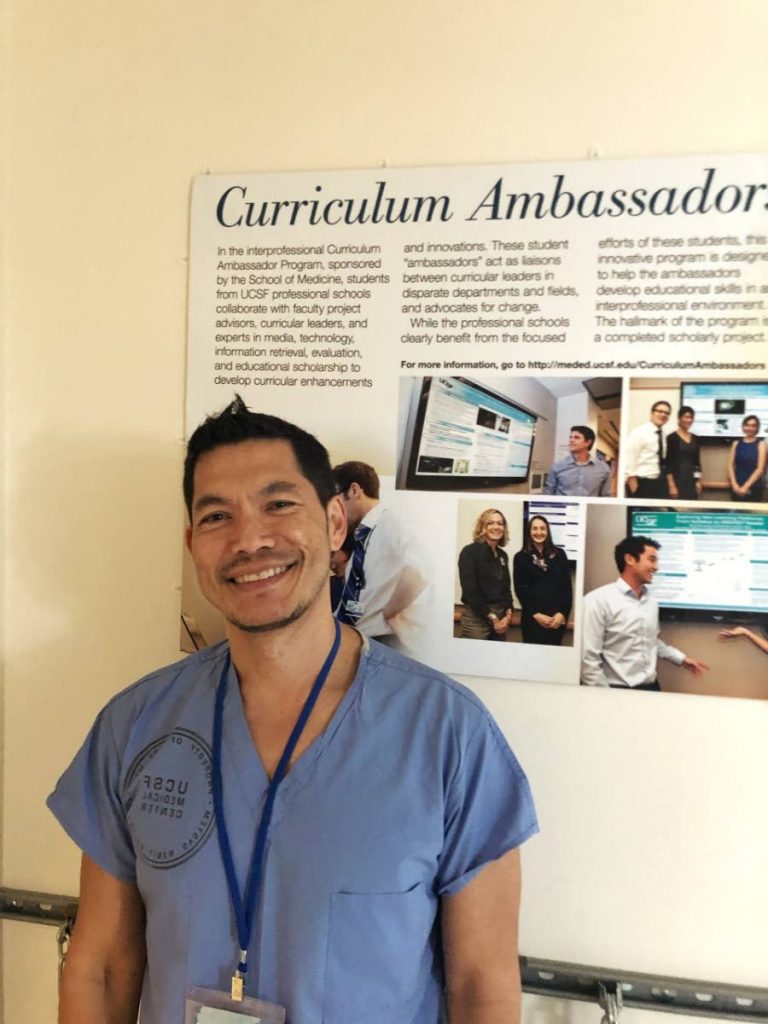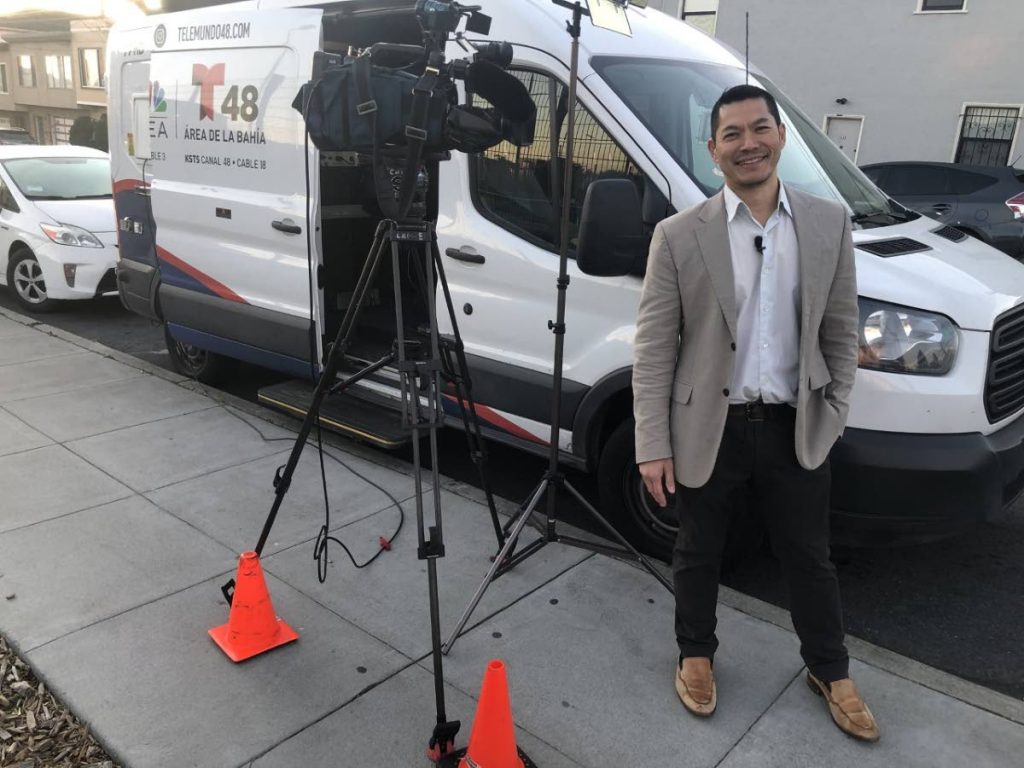Infectious disease expert: Say yes to the vaccines

Infectious disease specialist Dr Peter Chin Hong says the May 7 statement by the US Centers for Disease Control and Prevention (CDC) that covid19 is airborne is nothing new to panic about.
The update says, “Covid19 spreads when an infected person breathes out droplets and very small particles that contain the virus. These droplets and particles can be breathed in by other people or land on their eyes, noses, or mouth.”
The statement is simply an update of the transmission guidelines, but also coincides with what scientists have been saying for months.
Trinidad-born Chin Hong, a professor at the University of California, San Francisco, said “It’s just really summarising all the data, all the evidence that we know. It was officially written by the CDC, so it becomes highlighted in that way, as a national statement.”
He reminded that one of the three main ways covid19 is transmitted is by inhaling aerosolised particles from someone who has covid19. These very fine particles are light and can remain suspended in the air for minutes to hours, but they are subject to air currents.
“It being airborne only matters based on three factors: if it’s indoors with poor ventilation; more than 15 minutes of exposure; and the kind of activity happening in the setting.”
Activities that require exhaling with force such as exercising, shouting or singing generate these fine particles.
It is also much more dangerous indoors, especially if there is poor ventilation, and if people are there for an extended period.
Being outdoors or indoors where windows are left open is less risky, as the air currents blow the particles away and dilutes them. If the indoor space is not well ventilated, he recommends portable air cleaners with HEPA filters.
“The three main ways to slow down transmission are: outdoors, masks, and social distance. If you have two of the three, you’re good to go.”
The other two methods of transmission are by droplets and surfaces. Droplets spray out as people speak and even breathe, and could fall up to three feet away, which is why a distance of six feet is recommended between people.
Surfaces, he said, are not a major transmission risk.
“It’s nice to keep things clean but it’s not the major method to transmission. In fact, the CDC has updated its risk for surface transmission to be very low, like a one-in-several-thousand chance.”
Vaccine reduces virus load
Chin Hong told Sunday Newsday he was surprised to find out people in TT were hesitant about taking covid19 vaccines. He said the idea of vaccination should be old news to Trinis, as they get several vaccinations as babies, and sometimes as adults to travel, so they should understand its importance.
He said there is a big difference between natural immunity and immunity arising from vaccination.
“The side effects of the vaccine are temporary, as opposed to the effects of getting the real covid, where you are playing Russian roulette with who is going to get bad or chronic covid with a natural infection. "Who wants to get that sick? You can die, or you can have chronic symptoms that lasts months, especially if you’re older.”
He added that the vaccine reduces the amount of virus that enters the body, and the immunity lasts a lot longer and covers the variants.
He stressed that there is no cure for covid19 and the treatment can manage the symptoms and tame the virus – but people still die.
“As an infectious disease doctor, the thing that really matters most to me is that it prevents serious illness, hospitalisation and death.

PHOTOS COURTESY DR PETER CHIN HONG -
"This is mainly because our drugs are not great at treatment. We’re much better at preventing it than treating it if you get it badly.”
TT received its second delivery of vaccines from Covax on May 10 and is expected to get 100,000 Sinopharm vaccines from China on Tuesday.
Chin Hong said while the Chinese vaccines are “not as great” as AstraZeneca and the other popular vaccines, such as the Moderna and Pfizer vaccines, which prevent infections, they all prevent serious illness if infected, even with the variants.
“To give you some perspective, the flu vaccine is 40-60 per cent effective. By that standard, the Chinese vaccines are really good. And they would also prevent you from getting the bad outcomes of covid, even in the Brazillian variant.
"So I would encourage Trinidadians to think about getting any vaccine.
“The chance of getting a serious side effect is very, very small. Most people get mild side effects, but they go away. It’s just your immune system being trained to fight the real covid if it comes later on, although you don’t have to have symptoms for the immune system to be trained.”
He dismissed various conspiracy theories such as covid19 being a hoax, that the 5G cellphone network caused the virus, that the vaccine changes a person’s DNA or can give people covid19, and that there are microchips in the vaccines.
“The last time I checked, nobody ever developed a microscopic chip small enough to hide in a liquid.
"Plus, do you think they would be that cheap so as to have a chip in a vaccine and put it in people all over the world? That’s expensive technology. Do you think people would waste money to put chips in random people with vaccines?”
He said people worry that the vaccines were rushed, but scientists had been working on coronavirus vaccines for years, so they already had a base for the covid19 vaccine when the virus came along.
“And some of the vaccines have now been around for over a year with the original trials and we have been able to follow their progress. Also, millions of people have been vaccinated so far, so we believe they are very safe.”
Another problem around the world, he said, was that politicians frame the vaccines in various ways, using people’s fears to manipulate the masses for their own agenda. He advised people to speak to their medical professionals about the vaccines instead of listening to politicians or social media.
He added that because older people were vaccinated in the first phase of the rollout and therefore have a level of immunity, they are protected, leaving younger people more exposed to variants.
“What the variants do, including the Brazilian P1, is that they are more transmissible, they increase the amount of virus that enters the system, and people hold on to the virus a lot longer. So you can get sicker much easier. That is one possibility why younger people are now being hospitalised and are dying.”
He added that there was no way to get a “true snapshot” of the impact of the variants in a population, as the sequencing process to discover variants of the virus is very expensive.
He therefore encouraged people to get vaccinated as soon as possible for their safety, as well as that of their loved ones.


Comments
"Infectious disease expert: Say yes to the vaccines"